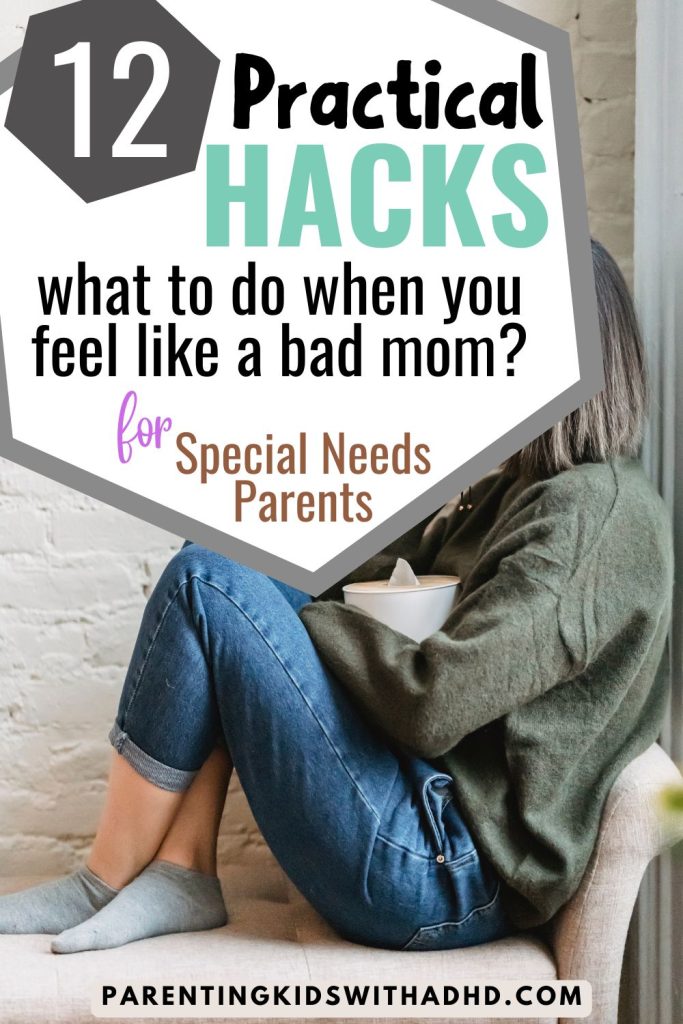12 Powerful Tips When You’re Feeling Like a Bad Mom

Introduction
If you’re like me… I’m sure you have had one of those days where everything spirals—your child’s emotions, your patience, and then… your thoughts? Suddenly, you’re standing in the kitchen and you’re feeling like a bad mom! I know…I’ve been there.
And if that’s you right now, take a deep breath. You are not alone, and you are not disqualified.
You are not a bad mom, and God loves you–right where you are!
For those days (or weeks?) that you’re feeling like a mom-failure, I gathered my 10 most useful strategies to stop feeling like a bad mother.
This post is a grace-filled reminder for weary moms like us, especially if you’re parenting strong-willed or ADHD kids.
We’ll talk about:
- Why feeling like a bad mom is so common (especially for Christian moms)
- What to do in the moment when you feel like a failure
- Scriptural truths that reframe your worth
- Encouragement to reset your motherhood through God’s heart of grace
- A personal peek into my own messy-but-grace-filled ADHD parenting journey
This is your invitation to experience what parenting by grace truly means—even when everything feels upside down.
Is it normal to feel like you’re not a good mom?
…is it normal when you’re feeling like a bad mom???
Oh friend, yes. It’s painfully normal—especially for moms raising strong-willed, sensitive, or neurodivergent kids.
I used to wonder: Is it normal to feel like a bad mom every single day? Before my son’s ADHD diagnosis, I lived in fear of school calls—not because I was worried for him, but because I dreaded hearing what he had done. I walked on eggshells, questioning every parenting choice.
When you’re raising a neurodivergent child, you face constant comparison. Other kids sit still. Other moms seem calm. Meanwhile, your child is bouncing off the walls or melting down because their banana broke in half. And you start thinking: “I feel like a bad mother because I can’t even get through one day without yelling.”
But here’s what I know now: comparison kills confidence.
Your journey is not meant to look like theirs. God gave you your child on purpose—for a purpose. Even on the messy days.
How do I stop feeling like a failure as a mom?
Can you do something to stop feeling like a bad mom? Yes you can!
First, you don’t have to hustle your way out of it. You can stop, breathe, and come back to God’s truth.
Grace-filled parenting isn’t about never making mistakes. It’s about learning to parent from a place of being parented—by God.
Try these:
- Confess and let go. “God, I yelled again. I’m sorry.” Then let Him wash over you with grace.
- Ask for daily strength. Grace isn’t a one-time pass; it’s new every morning (Lamentations 3:23 NLT).
- Reflect gently. Don’t spiral into “I’m a bad mum” mode. Ask: What triggered me? How can I respond differently next time?
There was a season when I felt like a failure almost every night. I’d lay in bed, replaying the yelling, the power struggles, the eye rolls. But the Holy Spirit began to whisper, “You don’t have to carry this alone.” I started writing down just one thing I did right each day—one smile, one hug, one time I stayed calm. That small act rewired my thinking.
Even if you say “I feel like a bad mom because I yell” or “I’m a terrible mom because I can’t handle homework time,” grace says: “You’re growing. You’re learning. You’re not alone.”

PIN ME FOR LATER!
What do you do when you feel like a bad mom?
When you’re in the thick of it—yelling, melting down, or hiding in the bathroom with tears—it’s easy to say, “I’m a terrible mom.”
But here’s the thing: feeling like a bad mother doesn’t make you one. It just means you care deeply.
That parenting guilt? It’s evidence of your love—not your failure.
I remember one particular day when my son had a massive meltdown right before school. He was overstimulated, yelling, and couldn’t find his socks. I yelled back. I was overwhelmed, tired, and feeling invisible. When I finally got him to school, I sat in the car and sobbed. “I feel like a bad mom,” I whispered to God.
But here’s what I’m learning—and want to pass on to you: those moments don’t define us. They’re invitations to grace.
I’ve gathered my tested and proven tips for when you’re feeling like a bad mother (even though you aren’t one…!).
12 ADHD parenting tips for when you’re feeling like a bad mom
Here are 12 powerful, grace-filled tips for when you’re stuck in that spiral of “I feel like a bad mother”—especially in the messy world of ADHD parenting:
1. Breathe before you believe the lie: the moment that thought hits—“I am a terrible mother”—pause. Take a deep breath. Interrupt the spiral before it runs wild. Your breath is a reminder that you’re still here, still trying, still mothering. That lie isn’t the truth, and it doesn’t deserve your agreement. Breathing slows your racing heart, clears your foggy mind, and invites the Holy Spirit into the moment. I’ve had to train myself to literally stop what I’m doing, put my hand on my heart, and breathe like I mean it—until truth starts to feel louder than mom guilt.
2. Pray messy prayers: You don’t need perfect words. Just whisper, “Jesus, help.” One of my go-to prayers has been: “Lord, meet me where I am—on the floor, in the tears, in the mess.” And guess what? He always does. God is not waiting for you to clean yourself up before coming to Him—He draws near to the weary, the broken, and the mom who just lost it after her ADHD child dumped flour on the floor for the fifth time. Prayer in the mess is powerful, because it invites God into the real moment—not the one we wish we were having. You can also take away the focus of yourself and toward your child, by praying for your child. It helps when we bless someone else.
3. Name what’s really going on: Sometimes what feels like failure is really just overload. Are you hungry, touched out, sleep-deprived? Has your strong-willed child been extra impulsive or hyper today? Naming the stress doesn’t excuse our reactions, but it helps us put them into context. You’re not crazy, you’re just carrying a lot—and often, unspoken loads weigh the heaviest. Once I started asking myself simple questions like, “Have I had water today?” or “Is this behavior triggering something deeper in me?”, I started showing myself more compassion.
4. Trade shame for truth: Shame whispers, “You’re a bad mom because you yelled.” But truth says, “You had a hard moment, and you’re still a loving, growing mom.” I’ve literally written down the lie I’m hearing, then right below it, written out the truth from God’s Word or what I know to be real. This habit—trading shame for truth—has been one of the most healing tools in my parenting. Because guilt can lead us to repentance, but shame keeps us stuck in self-condemnation. And friend, Romans 8:1 says there is no condemnation for those in Christ Jesus—not even for the yelling, exhausted, tear-stained mom.
5. Remind yourself of what you got right: When your day feels like a string of parenting “fails,” take a moment and remember the small wins. You showed up. You fed them. You hugged them. You tried again. Even if you said “I was a bad mom today,” I promise you also did something loving today. I’ve learned to remind myself of just one thing I did right—even if it was just letting my child snuggle beside me when I wanted space. These reminders help retrain our brain to see grace instead of guilt.
Wish you had someone who gets it? Someone who understands the meltdowns, the misjudgments, the mom-guilt?
That’s why I became a parenting coach for moms of ADHD kids. Let’s connect and create a new way forward—with grace, strength, and Jesus at the center.

6. Repair the moment: We all blow it. What matters more than the mistake is what happens after. Apologize to your child if needed. Don’t wait for a perfect moment. I’ve knelt down and said, “I’m sorry I yelled earlier. Mommy was overwhelmed. That wasn’t okay. But I love you so much.” These moments restore both hearts. ADHD kids especially benefit from modeling emotional repair—it teaches them that failure isn’t the end, and love is still safe even when things get hard.
7. Connect instead of correct (at first): Especially for ADHD kids, connection opens the door to correction. When you feel like a bad mom because of their big behavior, try hugging first. A gentle touch, eye contact, or simply saying, “I see you’re upset,” can soften their brain’s defenses—and yours too. I used to go straight into fixing and lecturing. But I realized my son didn’t need more words—he needed warmth. Correction matters, yes, but when it comes from connection, it lands deeper and lasts longer. It’s the difference between soft parenting and hard parenting.
8. Phone a friend: You don’t need a crowd. You need one or two grace-filled friends who can handle your “I’m a bad mom” texts and respond with truth. Find your “grace friend”—someone you can message and say, “Today was hard. I feel like I’m failing.” Let them remind you of what’s real when you can’t see it for yourself. I’ve cried voice notes to my friend, and she’s responded with Scripture, love, and no judgment. You were never meant to parent in isolation—grace flows best in community.
9. Practice self-compassion: You aren’t called to be perfect. You were called to be present. Sacred parenting means parenting with God, not for God—as if you’re earning His approval. You’re already His. Self-compassion isn’t self-indulgence; it’s spiritual humility. It says, “God, I’m human. You know my limits. Help me receive the same grace I give my child.” When I began showing myself the mercy I constantly showed my son, everything changed. Sacred parenting begins with letting God parent us, too.
10. Learn what grace parenting looks like for your unique child: Grace-based families don’t look alike. Some kids thrive on schedules, while others—like my ADHD son—need space to wiggle, play, and process out loud. Especially with ADHD parenting, one-size-fits-all advice often makes us feel worse, not better. Tune in to God’s whisper about your unique child. Ask Him, “Lord, how did You wire this one?” Parenting with grace isn’t about removing boundaries—it’s about applying them with love, intention, and Holy Spirit-led wisdom. And that looks different in every home.
11. Say it out loud: “I’m growing.” You’re not stuck. You’re growing. Yes, you’ve had messy moments. Maybe you yelled or shut down or said something harsh. But growth is happening. You’re not who you were yesterday. You’re still becoming. Every hard day is part of the journey—not a verdict on your motherhood. I’ve started telling myself aloud, “This is growth, not failure.” And hearing those words from my mouth shifts something deep in my soul.
12. Look at your child with fresh eyes: You’re not raising a “problem.” You’re raising a person—a soul deeply loved by God. When I stopped trying to “fix” my son’s ADHD and instead started seeing his God-given wiring, I stopped parenting from fear. It’s not easy—I still slip into old patterns. But when I look at him and remember who he really is—a worshiper, a leader, a big-hearted boy—I feel grounded again. Ask God for fresh eyes to see your child the way He does. Grace parenting begins when we parent from love, not from panic.
Truths to remember when you’re feeling like a bad mom
- You are not a terrible mom. You are a loved, growing, grace-filled woman raising a uniquely wired child.
- Your mistakes don’t define you. God’s mercy does.
- The fact that you’re reading this tells me you’re intentional. Present. Soft-hearted.
When you say, “I’m a bad mom,” God says, “You’re My daughter. I’m not finished with you yet.”
When you think, “I feel like a bad mom because I don’t know how to handle this,” God says, “Let’s handle it together.”
And when you think, “I’m a bad mom because my child is struggling,” God whispers: “But look—he’s growing. And so are you.”
Takeaway: Parenting with Grace When Feeling Like a Bad Mom
If you’re feeling like a bad mom today, let me lovingly remind you: that feeling is not your identity. Your motherhood was never meant to be lived perfectly. It was meant to be lived in partnership with the One who gave you that child.
Parenting by grace means accepting that you’ll mess up, but knowing you’re always welcome back in God’s arms. It means mothering from a place of wholeness, not hustle. It means offering yourself the same compassion you extend to your child.
Especially for those of us raising ADHD kids, grace is not optional—it’s our lifeline. The meltdowns, the impulsiveness, the hyper-focus, the school struggles… they can leave us drained and doubting. But God is faithful. He gives wisdom without finding fault (James 1:5 NIV).
You may have said today: “I was a bad mom,” or “I’m a terrible mom.” But grace says: You are growing. You are learning. You are still chosen.
And that, mama, is more than enough.
Disclaimer
Everything shared in this blog is based on my personal experience, ADHD parenting training, and as a certified, ICF-credentialed life coach. I am not a medical doctor, psychologist, or licensed therapist. The content is for informational and encouragement purposes only and should not be considered medical or mental health advice.
If you suspect your child may have ADHD or any other medical condition, please consult with a qualified healthcare provider, such as a clinical psychologist, pediatrician, or psychiatrist, for an official assessment and diagnosis.
I specialize in coaching Christian moms who are raising kids with ADHD—helping you parent with grace, confidence, and faith. If you’d like personalized support, feel free to reach out and learn more about how I can walk this journey with you.






